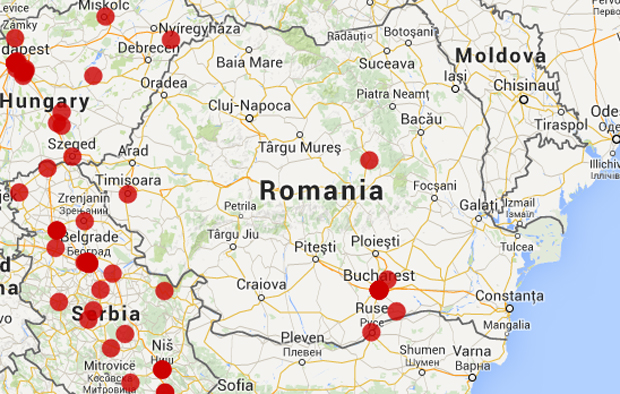21 Nov 2014 | Azerbaijan News, News, Politics and Society
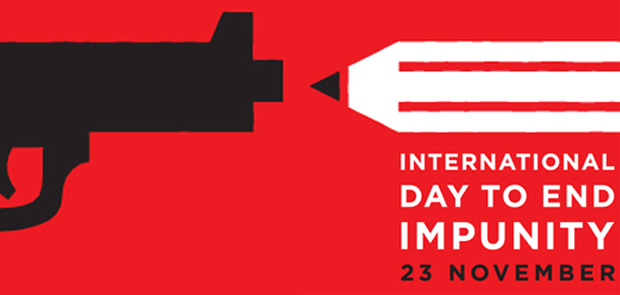
Impunity is a festering sore on freedom of the press. Harassment, violence and murder of journalists are problems around the world — even in Europe, as Index’s project mapping media violations has shown. The numbers speak for themselves: of the 370 media workers murdered in connection with their job over the past ten years, 90% have been murdered without their killers being punished. Many of these crimes aren’t even investigated.
Ahead of the International Day to End Impunity, journalists from across the world told Index why impunity is such a danger to free expression and a free press.
Kostas Vaxevanis, Greek investigative journalist, HOT DOC, and 2013 Index award winner
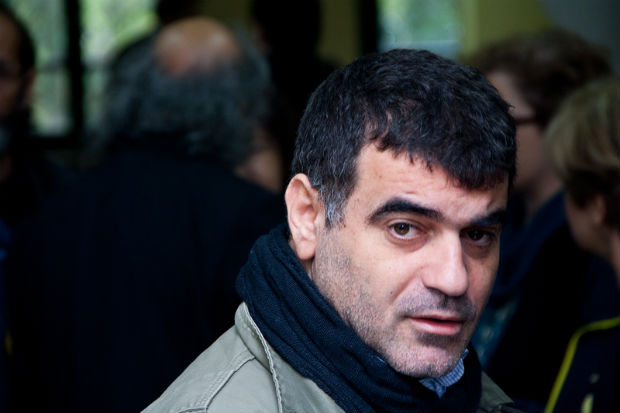
Impunity generates corruption and its enemy is the one thing that exposes and threatens it: the freedom of the press.
The HOT DOC is currently facing 40 lawsuits mainly from ministers and politicians in an attempt to shut us down as journalists. We reveal scandals like one with the minister of justice, a former judge who committed an “error” that granted amnesty to officials who had abused public funds, and instead of answering in public as required as politicians, we are being sued. We pester the courts and despite winning lawsuits, we need more than 80,000 euro per year for court expenses.
Heather Brooke, British-American journalist and 2010 Index award winner
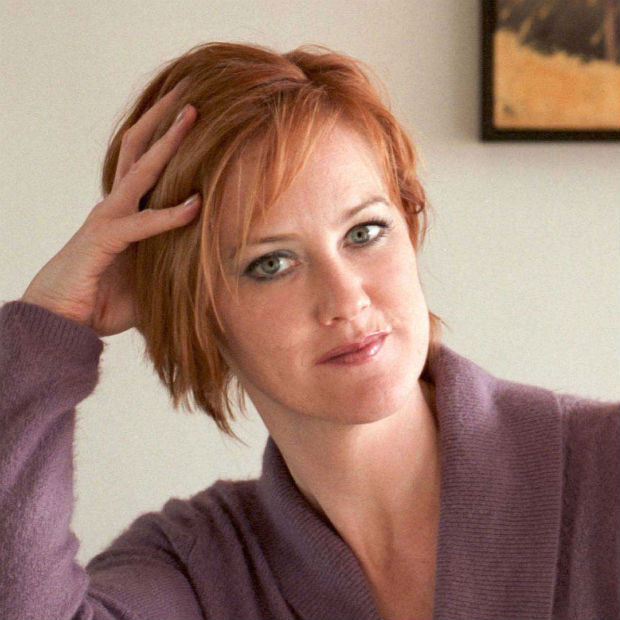
It is a problem that journalists around the world get threatened, intimidated and killed just for doing their job.
These crimes, like any other crime, need to be investigated. If not, it sends a message that this is okay; that the law is only for certain people. It is an implicit acceptance of this behaviour.
If we want to have a strong press, threats, intimidation and murder of journalists can’t be seen to be implicitly condoned by the state. It’s a dangerous message. It makes people frightened to ask tough questions, and if that happens, you are on the way to shutting down a robust press.
Kareem Amer, Egyptian blogger and 2007 Index award winner
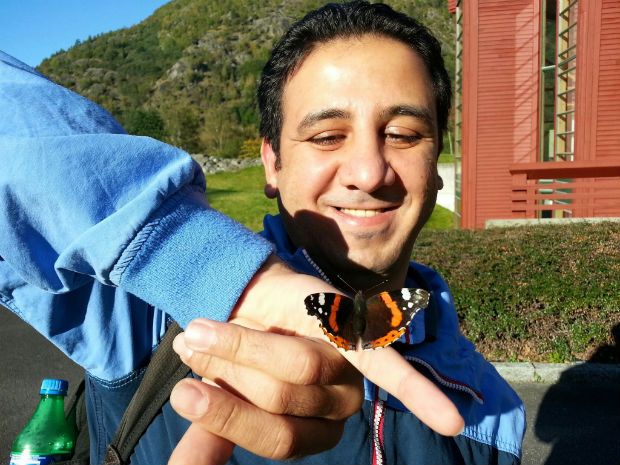
I come from a country where we have a lack of justice. The executive power controls the parliament and the justice system. People feel that if they get mistreated or oppressed by those in power nothing will protect them or bring them justice.
Not only people who express their opinions suffer from a lack of justice. People from different backgrounds who have a different way of thinking and different interests also don’t trust the justice system. Those who have more power can easily avoid punishment and take revenge against victims who tried to get their rights through judiciary system.
Officially, police officers don’t have any kind of formal immunity. According to the law they can be questioned if they violate the rights of people by torturing or murdering. But, in fact, all those accused of killing protesters and torturing prisoners managed to avoid being punished, with a few exceptions.
I feel that it’s not safe to express your opinions freely in a country where people can easily avoid punishment.
I have been sentenced to four years in jail for writing two articles and publishing them on the internet, and during that time I have been through physical violence and mistreatment committed by security forces. I reported it but no one has been questioned or punished. That made me feel that there is no justice in my country and that it is easy to be humiliated and tortured and you will not get protected, since the judiciary system is practically part of the executive power and the judges do what the authorities want them to do.
Rahim Haciyev, Azerbajiani journalist and acting editor of 2014 Index award winner Azadliq

Rahim Haciyev, deputy editor-in-chief of Azerbaijani newspaper Azadliq (Photo: Alex Brenner for Index on Censorship)
Freedom of expression is the basis of all other rights and freedoms. Free speech is something all authoritarian regimes are worried about as it threatens their existence. That is why freedom of expression is specifically targeted by authoritarian regimes. If there are no free people, there is no freedom of expression. Free speech is a precondition for journalists to be able to work in full strength and thus fulfill their functions in society. Authoritarian regimes organise permanent attacks on journalists with impunity. A free journalist armed with freedom of expression is a threat to an authoritarian regime, this is why perpetrators receive awards, not punishment for oppressing journalists’ rights. This process leads to self-censorship, and journalists stop being carriers of truthful information, which in the end affects society.
Nazeeha Saeed, award-winning Bahraini journalist, who was tortured in police custody
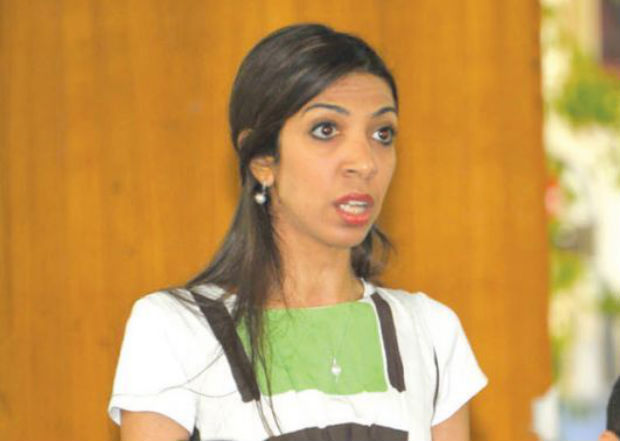
Impunity is a threat to free expression because journalists and people who report the facts on the ground will feel danger, and if no one gets punished for crimes against journalists or others it establishes a systematic impunity culture. Feeling insecure is something bad, it stops people from having a normal life, functioning and expressing themselves.
Endalk Chala, Ethiopian blogger and co-founder of the Zone9 blogging collective (of which six members are currently imprisoned for their writing)
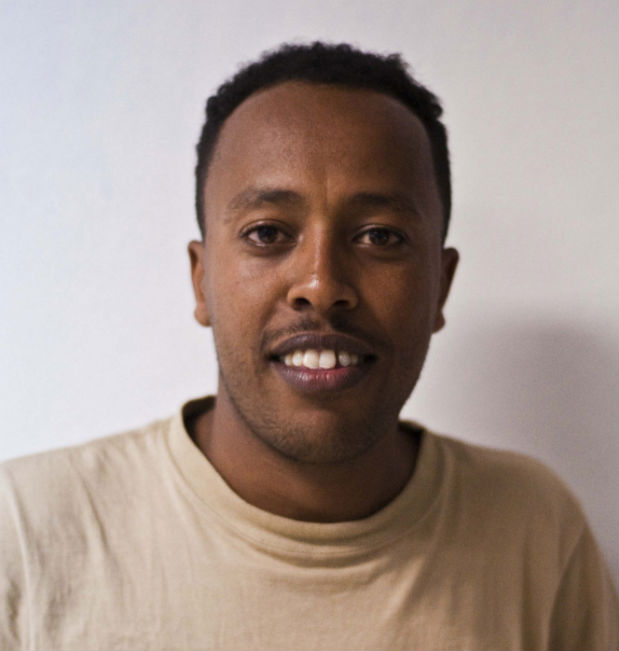
Impunity is a threat for free expression on many levels. In my experience I have seen impunity when it cultivates self-censorship. Let’s take the case of Zone9 bloggers. Since their arrest there are a lot of people who tried to visit them in prison, take a picture of them, attend their trial and tweet about their hearings but all of these have invited very bad reactions from the Ethiopian police.
Some were arrested briefly, others were beaten and it has become impossible to attend the “trial” of the bloggers and journalists. No action was taken by the Ethiopian courts against the bad actions of the police even though the bloggers have contentiously reported the kinds of harassment. As a result, people have stopped tweeting, taking pictures and writing about the bloggers. Apparently, the volume of the tweets and Facebook status updates which comes from Ethiopia has dwindled significantly. People don’t want to risk harassment because of a single tweet or a picture. This self-censorship could be attributed to impunity, which is pervasive in Ethiopia.
Impunity also causes a lack of trust in the Ethiopian judicial system. I don’t trust the independence of the Ethiopian justice system. I have never seen a police man/woman or a government authority being prosecuted for their bad actions against journalists. The Ethiopian government has been prosecuting hundreds of journalists for criminal defamation, terrorism and inciting violence but not a single government person for violating journalists’ rights. This tells you a lot about the compromised justice system of the country.
Andrei Soldatov, Russian investigative journalist and co-founder and editor of Agentura.Ru

Russia is known for its traditions of self-censorship. Despite what the laws say, the rules are explained in a quiet voice in some unmarked cabinets. Sometimes the rules are even not explained, and journalists, editors and owners of media have to constantly guess what is allowed at that moment. Not everyone is allowed to ask directly, so we are all in the game about signals sent by the authorities.
Journalists are beaten and killed in Russia, and this provides plenty of room to send such signals to the journalistic community. You don’t need to explain that investigative reporting in the North Caucasus is not allowed anymore: you just need to turn the investigation of Anna Politkovskaya’s assassination in 2006 into a show trial, where the assassins are duly found guilty, but the question of masterminds is never answered. You could be sure, the signal would be taken correctly.
Fergal Keane, Irish journalist, BBC foreign correspondent and 2003 Index award winner
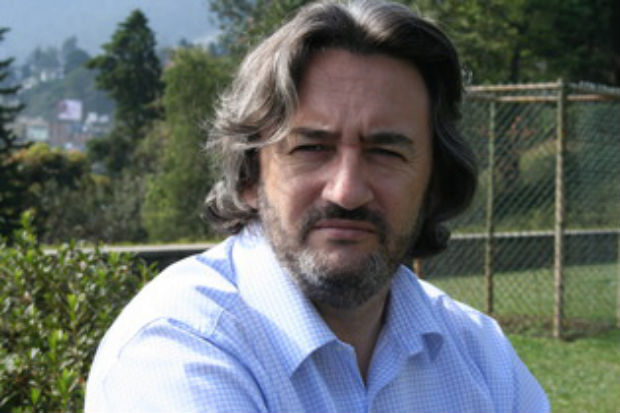
Impunity allows the enemies of free speech to threaten, torture and kill journalists secure in the knowledge they will never be called to account. I can’t think of a greater threat.
Veran Matic, B92 board of directors chairman and B92 news editor-in-chief
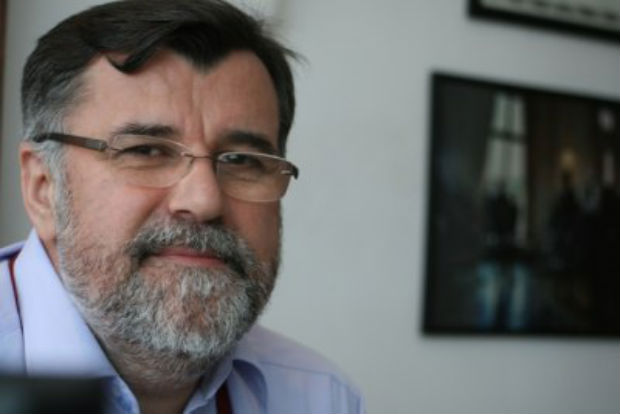
In my 25 years of experience in Serbia, I have been editor-in-chief of a media outlet that was banned on several occasions and I have been arrested.
Impunity directly encourages and expands violence towards journalists. The culture of producing fear is the most efficient form of censorship. One unsolved murder creates space for implementing the next one without any threat for the executioners. In the meantime, the media gets killed/eliminated in the process.
The lack of discontinuity with Slobodan Milosevic’s authoritarian regime had left room for impunity to remain intact.
Less than two years ago, I decided to make a kind of a breakthrough when it comes to impunity. I proposed the establishment of a mixed commission composed of journalists, members of the police and members of the security information agency. We managed to bring the 1999 murder of Slavko Curuvija to a phase where official indictment was brought, along with arrest of all suspects in this murder case. The 2001 murder of our colleague Milan Pantic is also in the final stage of investigation. A 1994 assassination — of Dada Vujasinovic — is being reviewed by the National Forensic Institute from The Hague because local institutions have compromised themselves in this case.
In the same way as impunity restricts freedom of speech, solving of these cases, at least 20 years later, will surely contribute to journalists being encouraged to do their job in the best possible way. Of course, I am not counting here on the new problems with which journalists and media face, and that call for finding new models of financing high quality journalism for the sake of public interest, worldwide.
The team behind Pao-Pao, a Chinese website focusing on internet freedom issues
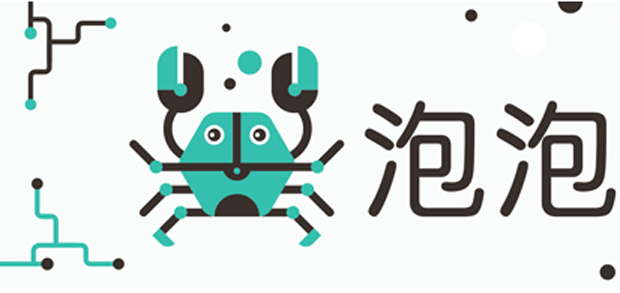
This year, we have seen a rising number of Chinese journalists, academics and human rights lawyers detained, threatened and arrested simply for speaking out online. While Chinese regulations on freedom of speech need to be closely examined, tech companies also play an important role in the deterioration of freedom of speech in China.
While Chinese tech companies are under the tight control of the Chinese authorities, there exists a culture of impunity in the western tech companies, especially when they are doing business in China. When we worked with our partner GreatFire to launch a FreeWeibo iOS application last year (an app to deliver uncensored content from Weibo, the largest social media platform in China), Apple decided to remove the app from their Chinese iTunes store. The only reason given was that Apple received a request from the Chinese authorities. This June, LinkedIn censored user posts deemed sensitive by the Chinese government on the global level, far beyond Beijing’s censorship requirement, even though LinkedIn does not have servers in China.
It would be the start of the end if these global tech companies start removing content simply because they do not want to upset their business relationships with China. It is crucial to hold these companies accountable for their behaviour. Otherwise it will further erode freedom of expression, not only for China, but also for the whole world.
The International Day to End Impunity was set up in 2011 by free speech network IFEX, of which Index on Censorship is a member, with the aim of demanding accountability and justice on behalf of those “targeted for exercising their right to freedom of expression”.
This article was originally posted on 21 November 2014 at indexoncensorship.org. It was updated at 14:09, 24 November to include the response from Pao-Pao.
13 Nov 2014 | Europe and Central Asia, News, Politics and Society, Russia, United Kingdom
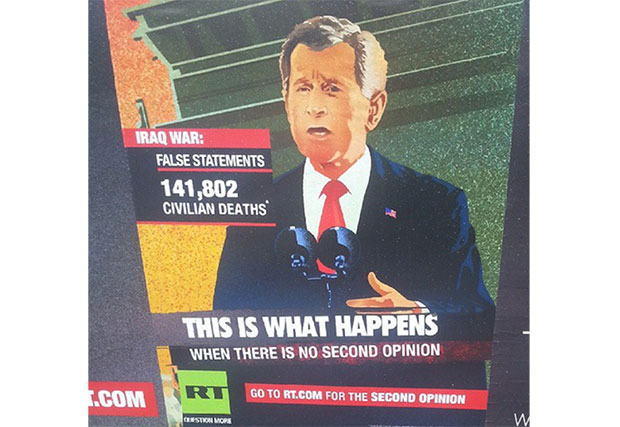
(Photo: Padraig Reidy)
There’s a poster near my house in London. It shows a poorly illustrated George W. Bush, aboard the USS Abraham Lincoln early in the Iraq war, with the now infamous “Mission Accomplished” banner behind him. To his side, the tally of dead in the Iraq War (at least according to Iraq Body Count). Underneath is emblazoned the slogan: “This is what happens when there is no second opinion.” It is an advert for Russian propaganda channel RT (formerly Russia Today).
It’s a slightly muddled poster, but the signal is clear: did you feel lied to about the Iraq war? Watch RT.
Curiously, RT, which launched a UK channel on 30 October, seems to believe the poster doesn’t exist. A “report” on the RT website, dated 9 October, claims that the campaign of which this poster is part was “rejected for outdoor displays in London because of their ‘political overtones’”. The story goes on to claim that the “rejected” posters were replaced by ones that simply say “redacted”, before urging readers to download an RT app to view the ads on their phones.
But I have seen the poster. I even took a picture. Yet RT insists it has been banned, saying that outdoor advertising companies cited the Communications Act 2003, which “prohibits political advertising”. This prohibition is indeed to be found in the act, but only applies to broadcast advertisements, not billboard advertisements for broadcasters.
This is a fairly crude illustration of RT’s attitude to the truth. It is simply not an issue. What’s important is something that might sound true, something just about plausible, to suit the agenda (in this case, the agenda is threefold: one, to get people to download the app; two, to sow the belief that “they” are scared of RT; and three, to introduce the notion that political advertising is subject to a blanket ban in the UK).
Fair enough, you might say. But have you seen Fox News? Don’t all sorts of news organisations bend the truth to fit their agenda? There’s a case to be made, but there’s also a crucial difference. RT is funded and controlled by the Kremlin and is on a mission; a mission outlined in a new report by The Interpreter, part of the Institute of Modern Russia (disclosure: Index on Censorship has on occassion crossposted content from The Interpreter).
“The Menace of Unreality: How the Kremlin Weaponizes Information, Culture and Money” elucidates what we had already long suspected: the Soviet Union may be dead, but Soviet tactics remain. And while the west may not want to believe it is in conflict with Russia, the Russians are already acting like it is (witness reports of heightened Russian air force activity in and near Nato airspace).
The report’s authors, Michael Weiss and Peter Pomerantsev, describe disinformation techniques dating back to the Soviet era: straight propaganda, certainly, but also Dezinformatsiya — the planting of false stories to undermine confidence in western governments. These include alleged coup plots, the bizarre theory that AIDS was created by the CIA, even the suggestion that the assassination of Kennedy was an inside job.
The suggestion is that democracy is a sham, and that democratic governments are at best hypocrites and at worst constantly, deliberately acting against the interests of their own populations.
The best false stories always have a ring of truth and a ring of empathy. Many politicians are hypocrites, some politicians act against the interests of those they should represent. If this much is true, is it that much of a leap to imagine that the entire system is a crock? That democracy and human rights are empty terms? We’re just asking legitimate questions, as every conspiracy theorist ever has said at some point.
Conspiracy theorists find a home at RT. Presenter Abby Martin, for example, who briefly won praise for apparently criticising Russia’s actions in Ukraine, says she still has “many questions” (just asking questions!) about the September 2001 attacks on the World Trade Center, and has used her show to expound on “false flag” attacks, alleged Israeli eugenics, and every US conspiracy theorists’ favourite, the massacre in Waco, Texas of David Koresh’s Branch Davidian cult in 1993.
All this would mean nothing if RT didn’t have a willing audience in the UK, the US and beyond. But a combination of a large budget, photogenic presenters and a certain way with a YouTube clip makes RT a serious player. It never quite veers into the straight out lunacy of Iran’s Press TV, which is quite open about its conspiracist contributors, and it looks like a serious operation. Furthermore, its positioning as an “alternative news source”, albeit one controlled by an increasingly authoritarian, paranoid and erratic Russian state, finds it fans among people who would rail against their own liberal states and societies (on the two occasions I visited the Occupy St Paul’s encampment in London, Russia Today was playing on a large screen there). All the while, the autocratic Putin is strengthened as democracy in undermined worldwide (witness how easily Putin was able to put the kibosh on effective intervention against Syria’s Assad through the relentless repetition of the line that helping the opposition would mean helping jihadist terrorists).
So what, as Lenin himself once asked, is to be done? After reports of UK broadcast regulator Ofcom’s recent investigations into RT for bias earlier this week, some people saw a chance to get RT taken off the air just weeks after it had begun. But this impulse is too close to political censorship in principle, and in practice, an ineffective sanction against a force that has huge power online, with millions upon millions of YouTube hits.
Decent democrats that they are, Weiss and Pomerantsev suggest eternal vigilance is required: we must be able to combat RT’s half truths and insinuations effectively, with hard facts and hard arguments, in order to stop them spreading. As ever, when arguments for counterspeech as the best defence against poison is suggested, one remembers Yeats’s lines: “The best lack all conviction, while the worst/Are full of passionate intensity.”
But this time 25 years ago, as East and West Germans embraced on top of the Berlin Wall, the world showed that the right argument can win even against the very worst. The Kremlin is playing the same games now as it did in its darkest days. Democrats should be ready to fight back.
This article was posted on 13 November 2014 at indexoncensorship.org
29 Oct 2014 | Europe and Central Asia, News, Serbia
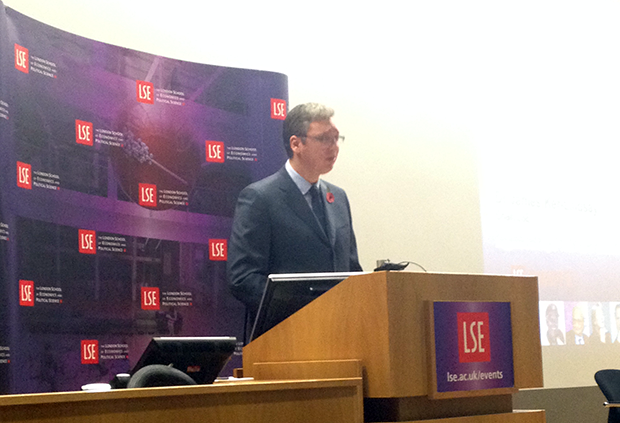
Serbian Prime Minister Aleksandar Vucic speaking at LSE (Photo: Milana Knezevic)
It wasn’t quite a remote controlled drone carrying a provocative political message, but Serbian Prime Minister Aleksandar Vucic’s Monday night lecture at the London School of Economics (LSE) came with its own controversial incident.
“What can you say about the total censorship of all opposition media”, Vucic was asked by a young woman in the audience just as the premier sat down for the question and answer portion of the event. She explained that she was representing Nikola Sandulovic, an opposition politician from the Serbian Republican Party, who was sitting beside her. Sandulovic said later he had travelled to London to confront Vucic.
Chaos ensued. Sandulovic claimed, among other things, that a police officer connected to Vucic had threatened to kill him and that he had evidence contained on a CD he held aloft. Vucic hit back that the Republican Party had only 0.01% of public support, and disputed Sandulovic’s assertion that he had been an adviser to former Serbian Prime Minister Zoran Djindjic, who was assassinated in 2003. Accusations flew across the room until LSE’s moderator James Ker-Lindsay finally managed regain control of the situation.
After the event, Sandulovic told Index he came to London because the media in Serbia ignore him and his party, apart from when government-friendly outlets attack him.
That press freedom was a popular topic on the night did not comes as a surprise. Serbia has seen a string of censorship incidents during Vucic’s time in power, as Index and many others have reported.
The prime minister himself brought up the press in his introductory lecture. He explained how his government has passed several new laws aimed at improving the media landscape, and complained that despite this, they are “scapegoated”. He directly addressed the recent controversial cancellation of a political talk show, Utisak Nedelje (Impressions of the Week), saying authorities have been subjected to a blame campaign for what was a commercial decision. Supporters of the show, including host Olja Beckovic, say it was down to political pressure.
In a joking reference to his infamous role under Slobodan Milosevic, he said he had been the “worst minister of information”. Curiously, he also used this former job as a counterargument to critics, arguing that his past had made it easy to blame him for any instance of censorship.
But this didn’t seem to stop the press-related questions, though none of the journalists present were chosen to ask one. Apart from the memorable Sandulovic intervention, an audience-member pointed out that Utisak Nedelje wasn’t the only show to have been taken off air in recent times.
If there was an overarching theme to the night, it was that it seemed to showcase different — some would say conflicting — sides of Vucic and his administration. He reminded the audience that Belgrade had recently organised a successful Pride parade, before adding that he didn’t want to attend. To have that choice, he argued, was a real mark of freedom.
There were, of course, questions about the football drone. While Vucic said he didn’t want to share his own views, he said UEFA (European football’s governing body) saw Serbia’s side of the story by awarding them the win, before pointing out that Serbia carries its share of the responsibility. The planned state visit from Albanian Prime Minister Edi Rama — the first in 68 years — will go ahead, he also confirmed, despite the post-drone postponement.
In response to questions about relations with Russia — just weeks after the Belgrade military parade where Vladimir Putin was the guest of honour — he said the two countries would continue to build their relationship, but that this would have no impact on Serbia’s ultimate goal of European Union accession.
Much has been made of Vucic’s apparent journey from Milosevic man to EU enthusiast. He seemed to reference this as he said he is “not perfect” and that he works “every single day” to change and better himself. But on Monday, he left more questions than answers about the direction he is taking Serbia in.
Mapping Media Violations in Europe: Serbia
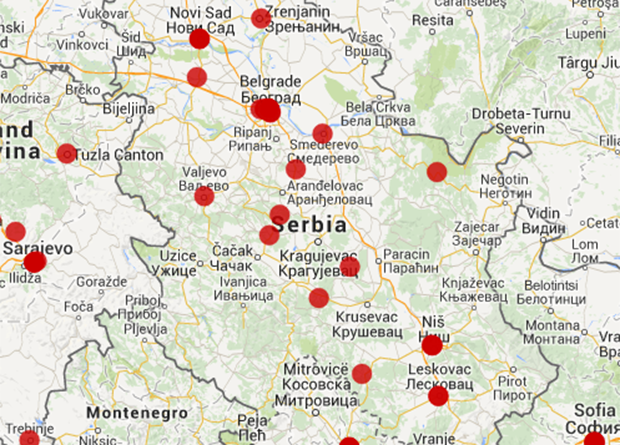
Five media outlets targeted with DDoS attacks
Protesters criticise cancellation of political talk shows
Deputy mayor fined for insulting journalist
Macedonian journalist released from extradition detention
Photographer injured by anti-pride parade protesters
This article was originally posted on 29 October at indexoncensorship.org
8 Oct 2014 | Mapping Media Freedom, News, Politics and Society, Romania
In November, Romanians are set to head to the polls to elect a new president from a field of 14 candidates during two rounds of polling. But one important participant, the National Audiovisual Council of Romania (CNA), will be sidelined as it loses its legally mandated quorum.
According to the CNA’s website, its role is to “ensure that Romania’s TV and radio stations operate in an environment of free speech, responsibility and competitiveness.”
While the first round of voting is set to get underway on 2 November, the CNA’s quorum of eight will be halved on 4 November when four members of the council step down at the end of their terms. If no candidate wins a majority in the first poll, the top candidates will compete in a second round on 16 Nov.
“Without a quorum, the CNA cannot function, and thus it cannot sanction the eventual abuses of television or radio stations during the election campaign,” said Narcisa Iorga, a CNA board member. Iorga believes politicians will benefit from this, as it is in their best interests to have an inactive CNA. Television stations will also use the situation in their favor, though they are already accustomed to breaking the audiovisual legislation, she added.
According to some members of the council, it could be January before the CNA regains its quorum and the ability to make decisions on issuing sanctions, well after the election campaign and the two rounds of voting.
The CNA is Romania’s only regulatory body overseeing television and radio programmes. In its watchdog role, the regulator ensures that legislation governing programming is respected. It’s a key role in a country where television is the dominant media among the population. Political parties and interest groups use the country’s live television shows to get their message across to the public.
By law, the CNA is supposed to have 11 board members. To maintain a quorum, eight members need to be present at the proceedings. The members, who have a mandate of six years, are nominated by the senate (three members), the chamber of deputies (three), the president (two), the government (three), and are confirmed by the parliament.
This is where politics comes into play: the parliament, controlled by a coalition led by the party of Victor Ponta, the prime minister who is the best-placed candidate at the presidential elections, did not vote to confirm the new members before the parliamentary vacation began. Therefore in less than a month, the CNA will have only seven members, one member short of the quorum.
Not having enough members to be able to take decisions is nothing new for the regulatory body. When there are politically sensitive issues on the table, some of its members usually go on a vacation.
For example, on 9 October a number of complaints against the Antena 3 news television will be debated, but it is more than likely that will be no quorum. Two CNA members are currently on vacation, and another two just announced their absence, wrote Iorga on her Facebook wall.
Media violation reports from mediafreedom.ushahidi.com
Penal code change could ensnare journalists
Falun Gong practitioner detained during interview
Journalists denied access to government building
Director of public television receives “warnings”
Jurnalul National editor assaulted and threatened
This article was published on 8 Oct 2014 at indexoncensorship.org















